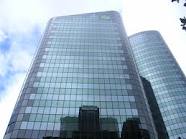The Operating Expense Ratio is used by commercial mortgage underwriters to catch commercial borrowers who are trying to cheat. The Operating Expense Ratio is defined as the Projected Operating Expenses divided by the Effective Gross Income (the Gross Income minus a 5% Reserve for Vacancy & Collection Loss), the result multiplied by 100%.
Operating Expense Ratio = (Projected Operating Expenses / Effective Gross Income) x 100%
Example: Suppose an apartment building owner is trying to refinance his 64-unit project. His Projected Operating Expenses for next year, including a 6% off-site property management factor*, is $248,064 per year. His Projected Gross Income is $1,000 per unit per month, or $64,000 per month. Assuming a 5% Reserve for Vacancy and Collection Loss, his Effective Gross Income per month is $60,800 (95% of $64,000). If we anualize that number, we get $729,600. Therefore:
Operating Expense Ratio = (Operating Expenses / Effective Gross Income) x 100%
Operating Expense Ratio = ($248,064 / $729,600) x 100%
Operating Expense Ratio = 34.0%
* Even if he manages the property himself, the owner has to figure in the cost of an outside management comapany because if the bank forecloses, the bank certainly isn't going to manage the property itself.
If this ratio is too low, according to industry standards, the commercial lender will simply disregard the projected operating expenses provided by the borrower or broker and use an assumption instead. This assumption is usually punitive and often kills the deal.
When most commercial mortgage borrowers apply for a new commercial loan, the single most important term in their minds is the loan amount. Most commercial mortgage borrowers want the largest commercial loan possible. If a commercial mortgage borrower is buying a property for, say, $1,000,000; he'll usually want to be able to borrow at least $750,000. This way he only has to put down $250,000 (25% of the $1MM purchase price).
In real life, most commercial mortgage borrowers will choose a $750,000 loan at 5.75% over a $690,000 loan at just 5.0%. It's the loan size, not the interest rate, that is usually the most important commercial loan term.
The problem, however, is that the commercial loan size is limited by the debt service coverage ratio. You'll recall that the debt service coverage ratio is defined as the net operating income (NOI) divided by the debt service (annual principal and interest payments on the proposed loan). Most commercial lenders today require a debt service coverage ratio of at least 1.25.
The higher the NOI, the larger the commercial loan for which the borrower can qualify, given a particular debt service coverage ratio.
Borrowers and brokers therefore have a large incentive to make the projected expenses on their operating statements look as low as possible. After all, the lower the projected expenses, the higher the NOI appears. The higher the NOI appears, the larger the commercial loan for which the borrower can qualify.
Commercial lenders therefore must be very suspicious of the projected operating expenses provided by either the borrower or mortgage broker. The projected operating expenses are often understated or fudged.
So how can a commercial lender check to see if the projected operating expenses are reasonable or understated? Commercial lenders use the Operating Expense Ratio to check to see if the projected operating expenses are reasonable.
So what are these industry standards for the Operating Expense Ratio? We will cover them in our next blog article, Operating Expense Ratio II - What Ratios Will Commercial Lenders Believe.
If you found this training article to be instructive, you might want to subscribe to our blog and enjoy free training in commercial real estate finance.
More commercial real estate loans are ballooning in 2016 than in any year in history. For well-trained commercial mortgage brokers, it will be like a turkey shoot.
Got a bankable commercial loan? Find scores of banks hungry to make commercial loans. And C-Loans is free to borrowers and commercial mortgage brokers.











 You should focus-focus-focus your commercial mortgage brokerage practice on your
You should focus-focus-focus your commercial mortgage brokerage practice on your 
 When I was around twelve years old, my parents took me to a theater to see an action movie about the ancient Mayans. I have never forgotten the terrifying scene where the priests dragged a lovely, young Indian maiden up the 200 steps of the their stone pyramid and held her down over a stone altar. Then an ugly old priest looked up at the Sun God, chanted some nonsense, and drove his knife into the terrified maiden’s chest. He carved for a minute or two, and then he held up her still-beating heart for all of the people to see. Yikes! I was much too young to see such real-life violence.
When I was around twelve years old, my parents took me to a theater to see an action movie about the ancient Mayans. I have never forgotten the terrifying scene where the priests dragged a lovely, young Indian maiden up the 200 steps of the their stone pyramid and held her down over a stone altar. Then an ugly old priest looked up at the Sun God, chanted some nonsense, and drove his knife into the terrified maiden’s chest. He carved for a minute or two, and then he held up her still-beating heart for all of the people to see. Yikes! I was much too young to see such real-life violence. We have talked in depth about why large commercial loans are so difficult to close. First of all, large loans have to almost perfect because so many executives have to sign off on the deal.
We have talked in depth about why large commercial loans are so difficult to close. First of all, large loans have to almost perfect because so many executives have to sign off on the deal.




 As the operators of
As the operators of  a brilliant job in describing the issues and difficulties facing a lender that wants to fund the completion of construction of a partially completed building.
a brilliant job in describing the issues and difficulties facing a lender that wants to fund the completion of construction of a partially completed building.



